To date, there have been 659 skaters and 65 goalies to play at least one game in a Pittsburgh Penguins uniform. There are the obvious ones, like Mario Lemieux or Sidney Crosby, but there is a long list of star players who spent a small portion of their illustrious careers in the Steel City.
Related: Eddie Olczyk Embodies Passion for Life, Hockey
Here is a list of 18 NHL stars that you may not have known, or had forgotten, played in the Penguins organization for a short period of time. This list includes Hall of Famers and fourth liners alike, but all made their name known in the hockey world.
Leo Boivin
Hall of Famer Leo Boivin was selected by the Penguins after the Detroit Red Wings left him exposed during the 1967 NHL Expansion Draft. He played 114 games with them, but it was not his first stint playing in Pittsburgh. He played with the AHL’s Pittsburgh Hornets for 30 games in 1951-52 before making his home in the NHL the following season.
Boivin played 1,150 games in his career, most of them with the Boston Bruins where he was captain for four seasons.

The blue-liner credited the Penguins and the NHL expansion as the reason his career developed. He was 35 at the time and had played 16 seasons in the NHL before Pittsburgh took him and gave his career a resurgence. Boivin found relative success with the Penguins, scoring 14 goals, which is the second most he put up with a single team behind his tenure with the Bruins.
Glen Sather
Inducted into the Hall of Fame as a builder in 1997 for his coaching and managerial success with the Edmonton Oilers and their five Stanley Cup championships, Glen Sather also played 10 seasons in the NHL.
His 658 NHL games are nothing to scoff at, and 122 of those were played with Pittsburgh. The Penguins took him from the Bruins in a 1969 Intra-League Draft. The left-winger posted 37 of his 193 career points with the Penguins, but he made a name for himself behind the bench after his playing career.
Sather has a 497-307-121-7 career record as head coach, and he won the Jack Adam’s Award as the league’s best coach in 1986. As a general manager, Sather drafted Grant Fuhr, Jari Kurri, and Paul Coffey, and became one of the main forces behind the Oilers’ dynasty.
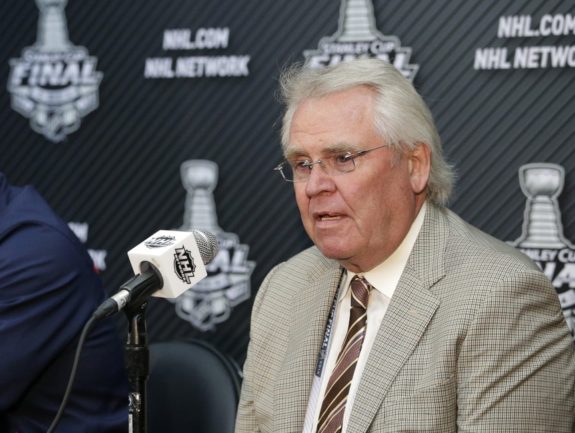
While playing with the Penguins, he scored his only career hat trick in a 9-1 win over the Red Wings in 1970. That season was also the first time the Penguins made the postseason, and Sather tallied two assists in their first-round sweep of the California Golden Seals.
Tim Horton
Tim Horton, best known as the fast food and coffee connoisseur, made his name on the ice with the Toronto Maple Leafs, but near the end of his long career, he spent a season with the Penguins.
Related: Tim Horton – The Player That Brought Us Coffee
In the 1971-72 season, Horton wore a different version of blue and white with the Penguins. It was his second time playing in Pittsburgh, after three seasons with the Pittsburgh Hornets from 1949 to 1952. In 1951-52, he shared the blue line with another former Penguin; Boivin.
At 42 years old, Horton was selected by the Penguins in an Intra-League Draft before that season. He was the oldest player on the roster and played 44 games with 11 points.
Horton’s career will never be forgotten. He was more than a hockey player in the city of Toronto, where he played 20 seasons. He became a four-time Stanley Cup champion and the first Maple Leaf to play 1,000 games. After his one season with the Penguins in the summer of 1972, he was taken by the Buffalo Sabres in another Intra-League Draft.
Eddie Shack
Clear the tracks, here comes Shack! The great entertainer and four-time Cup champion found himself bouncing around from team to team after the 1967 Expansion, eventually landing in Pittsburgh where he was reunited with his former Maple Leafs teammate, Horton, at the tail end of the 1971-72 season.
Related: Eddie Shack’s Productive Goal-den Years
Eddie Shack had his second most successful season in a Pittsburgh sweater in 1972-73, when he scored 25 goals and 20 assists. He also scored his final career hat trick, fittingly against the Maple Leafs.

In the trade that brought Shack to Pittsburgh, the Sabres received Rene Robert, completing the “French Connection” line that was a mainstay in Buffalo for seven seasons.
Marty McSorley
One of the most feared fighters in NHL history, and Wayne Gretzky’s bodyguard in Edmonton and Los Angeles, got his start with the Penguins. Marty McSorley was undrafted before being signed by Pittsburgh before the 1983-84 season. He played 72 games that season and 15 the following. After the 1984-85 season, he was traded to the Oilers, where he was a part of “The Trade” that sent him and Gretzky to the Los Angeles Kings.
Before the start of the 1993-94 season, he was traded back to Pittsburgh where after 47 games and 139 penalty minutes (PIMs), he was again traded to the Kings. In total, McSorley played 134 games with Pittsburgh and scored 5 goals and 25 assists.
McSorley picked up 3,381 PIMs in his 17 seasons in the NHL, which puts him fourth all-time in league history. During his two stints with the Penguins, he recorded 378 PIMs, 224 of them in his rookie campaign. He is one of only 19 players to record 200 or more PIMs in their rookie season.
Luc Robitaille
Another Hall of Famer that found himself in the Penguins locker room is Luc Robitaille. In 1994-95, he scored 42 points in 46 games. It may have been a statistical low for him, but given it was a shortened season, it was still a successful one.
Related: Luc Robitaille – King of His Time
During his time with the Penguins, Robitaille scored 23 goals and 19 assists and was fourth in team scoring. In the 1995 playoffs, he put up 11 points in 12 games, again ranked fourth on the team. He scored his third and final four-goal game against the Hartford Whalers. At the time, the Penguins had an early season 11-0-1 record and won 5-2.
He may not have played in Pittsburgh for long, but it was long enough to earn a couple of seconds of screen time in the Jean-Claude Van Damme movie, “Sudden Death.” It’s a quick scene, featuring Robitaille speaking in his native French language. You can also see jerseys hanging around the locker room, including Jaromir Jagr’s and Larry Murphy’s.
At the time of his retirement in 2006, he was the all-time NHL leader in goals and assists by a left-winger. He is also the Los Angeles Kings’ all-time leader in goals. He is among the NHL’s top 100 players and was inducted into the Hockey Hall of Fame in 2009.
Sergei Zubov
Just before his fourth season in the NHL, Hall of Fame defenseman Sergei Zubov was traded to the Penguins with Petr Nedved from the New York Rangers for Robitaille and Ulf Samuelsson. During his single season with the Penguins, the team finished first in the Northeast Division, and made it as far as the Eastern Conference Final.

During the 1995-96 season, Zubov recorded 66 of his 771 career points, to become the highest-scoring defenseman on the roster. In the playoffs, he was again the highest scoring defenseman on the team, with 15 points in 18 games.
Related: One for the Ages – Sergei Zubov’s 1993-94 Season
After that season, Zubov made his name with the Dallas Stars and retired with the most points in NHL history from a Russian-born defenseman. He retired from the NHL in 2009 and was part of the most recent induction into the Hockey Hall of Fame in 2019.
Patrick Lalime
This goaltender made himself known as the backstop for the Ottawa Senators with multiple 30+-win seasons, but Patrick Lalime was drafted by and played his rookie season with the Penguins. Picked 156th overall in the 1993 NHL Entry Draft, he worked his way through the ECHL and the IHL before getting his first start in the NHL in 1996.
Lalime played 39 games in the 1996-97 season, recording 21 wins and finishing fifth in Calder Trophy voting for the NHL’s Rookie of the Year; the highest voted rookie goalie that season. He finished his rookie season with a 21-12-2 record and a .913 save percentage.
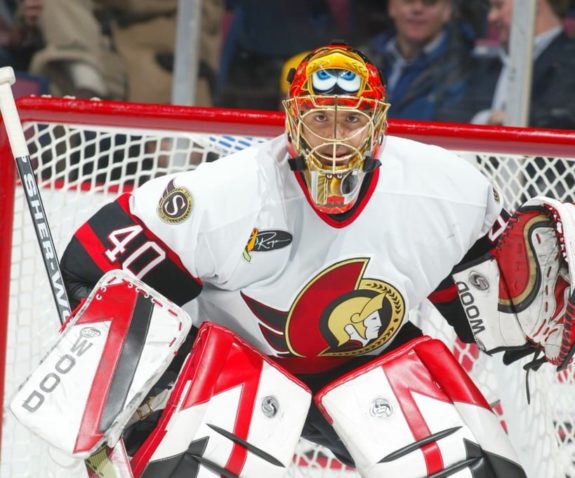
Lalime had a 14-0-2 record to start his career before his first official loss. After that season, he was sent back to the IHL’s Cleveland Lumberjacks. His rights were eventually traded from the Penguins to the Anaheim Mighty Ducks in 1998.
He may not be a future Hall of Famer, but he holds the Senators record for shutouts with 30 and is second in wins with 146. He ranks second in most Senators goalie stats behind Craig Anderson. Lalime collected 200 career wins in 444 games, and it all started with the Penguins in 1996.
Garth Snow
Long time general manager of the New York Islanders, Garth Snow also had a respectable career as a goaltender in the NHL with 135 career wins. The Penguins signed him before the 1999-2000 season, his only time in Pittsburgh. The Penguins made it to the Eastern Conference Final that postseason, but Snow did not play a single playoff game. However, he did have a hand in making Penguins history.
Related: Garth Snow’s Most Memorable Trades
Snow played in a game that will be remembered forever. He was the starting goalie for the Pens on Dec. 27, 2000, the day Lemieux returned to the ice as a player. It was a great game for Lemieux but also for Snow who pitched a 40-save shutout against the Toronto Maple Leafs.
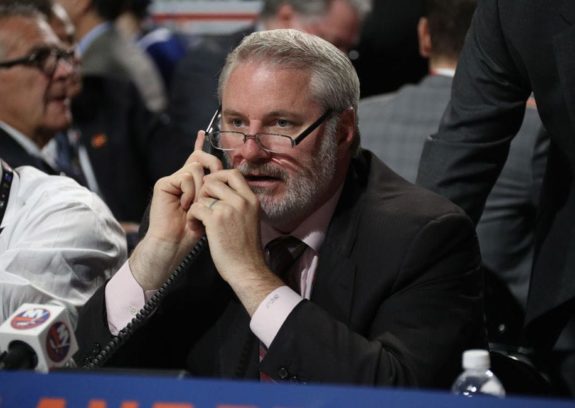
In Snow’s single season with the Penguins, he played in 35 games, picking up 14 wins, including three shutouts. After the season, Snow signed with the New York Islanders where he finished his NHL career and become a front office figure in 2006.
Marc Bergevin
These days, Marc Bergevin is known as the general manager of the Montreal Canadiens, but before that, he had a long career as an NHL defenseman. Mostly a journeyman, he played 1,191 games for nine different teams and spent parts of three seasons with the Penguins in the latter part of his career, playing 157 games.
Bergevin’s time in Pittsburgh was strange, as he never played a whole season with the team. He was traded to the Penguins from the St. Louis Blues for 36 games in the 2000-01 season, then signed back with the Penguins as a free agent before the 2002-03 season. He was traded before its conclusion. Finally, he returned to Pittsburgh in a trade with the Tampa Bay Lightning the next season and the Penguins dealt him to the Vancouver Canucks after 52 games.
In his 157 games in Pittsburgh, he scored four goals and 17 assists. During his first stint with the team in 2000-01, he played in 12 of 18 postseason games, recording a single assist. The Penguins lost in the Conference Finals to the New Jersey Devils.
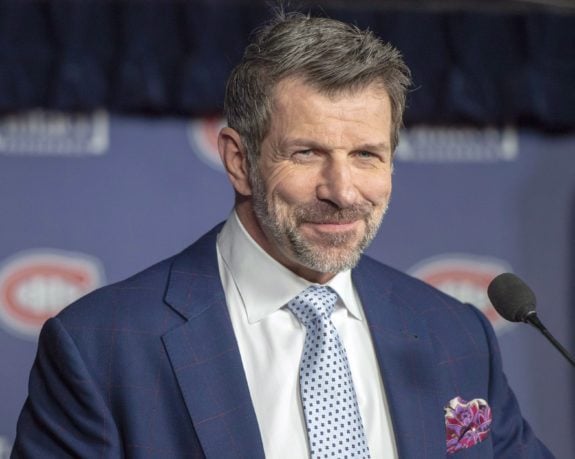
Bergevin has been in management since 2006, starting with the Chicago Blackhawks where he was appointed the director of player personnel. The Blackhawks won the 2010 Stanley Cup while he was in that position.
Alexandre Daigle
Known as one of the biggest (if not the biggest) busts in draft history, Alexandre Daigle’s career was infamous after he failed to live up to expectations. He was expected to become one of the best players in the league, after putting up 247 points in 119 games in the Quebec Major Junior Hockey League.
After a two-year absence from the game, Daigle found himself with the Penguins organization. During the 2002-03 season, he played with both the Penguins and their AHL affiliate, Wilkes Barre/Scranton Penguins (WBS). In Pittsburgh, he played 33 games and only recorded seven points. In WBS, he played 40 games and had 38 points.
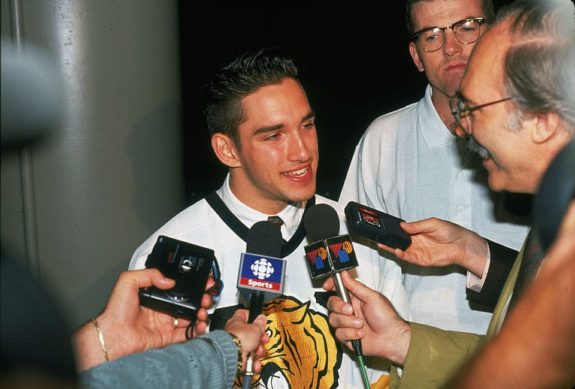
His time in Pittsburgh was short but his NHL story is one that won’t soon be forgotten. The first-overall pick in the 1993 Draft (by the Ottawa Senators) recorded a 50+-point season only three times in 10 seasons.
Zigmund Palffy
Zigmund Palffy, also called Ziggy, could be one of the most underrated players in the NHL. He quietly played in four All-Star Games, three Olympics games for Slovakia, and recorded over 700 points. His final NHL season was with the Penguins in 2005-06, when he put up 42 points in 42 games.
He finished his career prematurely at the age of 33. After signing a three-year deal, he only played part of one season in Pittsburgh. According to Penguins general manager Craig Patrick, he retired because of a lingering shoulder injury.

In the summer of 2007, Palffy announced he was returning to the game to play with his hometown team, HK 36 Skalica. He continued to put up spectacular numbers in the Slovak League, officially ending his playing career with 383 points in his last 222 games.
John LeClair
After playing on the Philadelphia Flyers’ “Legion of Doom” line with Mikael Renberg and Eric Lindros, John LeClair finished his career in Pittsburgh. Signed as a free agent before the 2005-06 season, he played 94 games with the team before being cut and retiring in December of 2006.

In his 94 games with the Penguins, LeClair scored 58 points, including 24 goals. Despite those points, he played on a Penguins team that finished the 2005-06 season with 22 wins. For the first time in his career, he was a minus player at minus-24. Before being released in 2006, the last 21 games in his career led to another minus season, minus-2.
Despite his minus-26 in Pittsburgh, LeClair still ended his career at plus-204. He also finished with 406 goals and 413 assists for 819 points.
Gary Roberts
“Scary” Gary Roberts joined the Penguins at the age of 40 during the 2006-07 season, and as the veteran presence on a young team. Some of the team’s best players were under the age of 21; Jordan Staal, 18, Crosby, 19, Evgeni Malkin, 20.
Related: One for the Ages – Gary Roberts’ 1997-98 Season
On top of being a very young team, this Penguins squad brought in Roberts to round out its veteran depth after LeClair’s departure, and Mark Recchi was waived. Roberts joined a team that lost Lemieux the season before his second retirement.
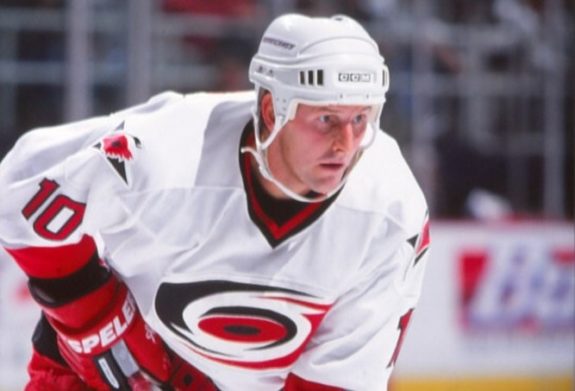
For a career, Roberts scored 438 goals and 910 points in 1,224 games. With the Penguins, he recorded 10 goals and 28 points in 57 games. His skill may have been fading as he reached the end of his career, but he was one the toughest and most fit players on the ice at any given time, even at his age.
Paul Bissonnette
Known today as one of the biggest media figures in the sport, Paul Bissonnette got his chance to play professional hockey with the Pittsburgh organization. After bouncing between the WBS Penguins of the AHL and the Wheeling Nailers in the ECHL, and after moving from defenseman to forward, Bissonnette got his first 15 NHL games under his belt with Pittsburgh during the 2008-09 season.
In those 15 games, he scored no goals and only a single assist, but he was a bruiser, collecting four fighting majors in his rookie season. That was all with limited ice time, as he never surpassed eight minutes in a game with the Penguins.
In the Penguins’ farm system, Bissonnette played 101 ECHL games with 69 points and 162 PIMs. In the AHL, he played 161 games with 30 points and 381 PIMs. After recording his first NHL point, an assist on a Tyler Kennedy goal, the very next faceoff Bissonnette dropped the gloves with heavy-weight Arron Asham.
Steve Sullivan
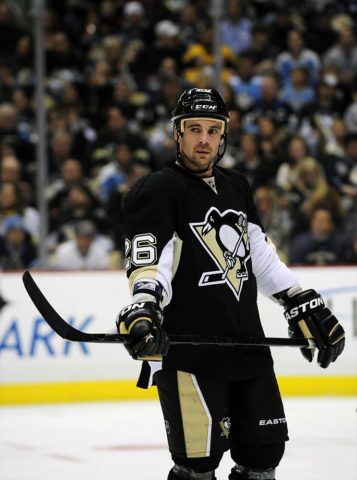
Steve Sullivan turned 37 just before joining the Penguins. He signed a one-year deal for the 2011-12 season, after recording 600 career points in 800 games.
At only 5-foot-9, Sullivan was never the biggest player on the ice, but he made a name for himself with multiple 60- and 70-point seasons. His season in Pittsburgh was successful with 48 points in the regular season. He then surpassed two achievements not many players reach.
While wearing a Penguins uniform, he eclipsed 900 games played and 700 points. During the playoffs that year, he put six points (two goals, four assists) in six games.
The Penguins did not re-sign Sullivan that offseason, but the Phoenix Coyotes did. He played his 1,000th career game with the Coyotes that year and finished his career with 290 goals and 747 points in 1,011 games.
Jarome Iginla
Everyone remembers when then-general manager Ray Shero traded for Jarome Iginla in 2013. It was a late-night trade near the deadline that loaded the Penguins for a deep playoff run.
Related: Jarome Iginla’s 5 Greatest Highlights
At the time of the trade, Iginla was the greatest player in Calgary Flames history, with 1,095 points in 1,219 games. He retired after the 2016-17 season, and the Flames did the same for his no. 12, raising his jersey to the rafters on Mar. 2, 2018.
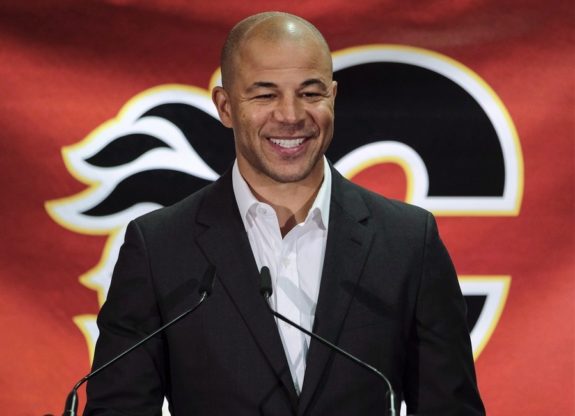
Iginla had a limited no-trade clause in his contract with the Flames. However, the Penguins were among the list of teams he agreed to be traded to, and playing with stars like Crosby and Malkin was attractive.
Iginla played 13 regular-season games with the Penguins, recording five goals and six assists. In the playoffs, he posted 12 points in 15 games before the Penguins were swept by the Bruins in the third round. Iginla, and the team’s top scorers Crosby, Malkin, and James Neal, combined for zero points.
That offseason, Iginla signed with the Bruins and recorded his final 30-goal season. When the Penguins made the move for Iginla, they were expected to bring the veteran his first Stanley Cup championship.
David Perron
A Stanley Cup Champion currently in his third stint with the St. Louis Blues, David Perron spent a portion of his career flipping between teams. In the back half of the 2014-15 season, he landed in Pittsburgh, where he played 86 games before being traded to the Anaheim Ducks during the 2015-16 season.

Usually playing alongside Malkin, Perron scored 16 goals and 38 points with the Penguins. His second half in Pittsburgh, however, was not very successful, potting four goals, before he was traded for Carl Hagelin.
Perron had the unfortunate luck of playing with the Penguins during a season that took them until game 82 to qualify for the playoffs. He was then traded in the middle of the next season, which ended in a Cup victory. He played one postseason series with the team, a five-game loss to the New York Rangers in 2015.
Other than that cold streak before he was traded to Anaheim, Perron has had an under the radar career in the NHL. Since the start of the 2007-08 season, he is fifth in the league in points.
The NHL has seen many icons in its 100+-year history, and the Penguins have played host to quite a few of them. Even if it was only for a short time, many Hall of Famers and elite players have donned Pittsburgh’s black and gold (or blue and white).